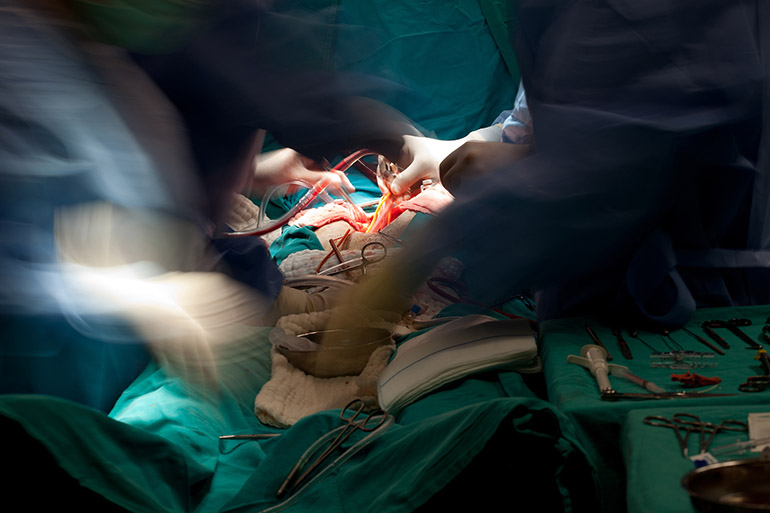Contamination at a German factory that makes crucial machines used during open-heart surgery is the likely source of a global outbreak of deadly infections tied to the devices, the largest analysis to date shows.
Scientists using whole-genome sequencing matched the DNA fingerprints of samples taken from infected heart-surgery patients from several countries, including the U.S., to samples from the devices, called heater-cooler units, in multiple hospitals — and at the production site.
The study, published Wednesday in The Lancet Infectious Diseases journal, concludes that heater-cooler devices made at the LivaNova PLC plant in Munich, Germany, were contaminated during production.
The analysis provides a critical piece of the puzzle behind more than 100 severe — and sometimes fatal — infections in cardiac surgery patients worldwide since 2013, researchers said.
“Our study closes the missing gap,” said Stefan Niemann, a professor with the German Center for Infection Research and one of the study’s co-authors.
However, officials with LivaNova said that the study was too limited to draw conclusions.
“LivaNova is concerned that the article expresses a level of certainty about a point source tie to the manufacturing process that is not warranted by the data,” spokeswoman Deanna Wilke wrote in an email.
Scientists from Germany, the Netherlands and Switzerland analyzed 250 DNA samples of Mycobacterium chimaera, an organism typically found in soil and tap water.
The review included samples from 21 infected patients in Switzerland, Germany, the Netherlands and the United Kingdom, and data from another 12 in the U.S. and Australia. The analysis included samples from heater-cooler devices by LivaNova and a second German brand, Maquet, plus hospital water sources and environmental sources.
Scientists found a high degree of similarity in samples from the patients and from the LivaNova heater-cooler units and the LivaNova factory.
The authors noted that they were not able to link individual patients to particular heater-cooler units because they lacked enough water and air samples to document transmission. Infections have been linked to contaminated water in the devices that is then misted into the air.
They also warned against ending investigations into the problem too soon. Researchers found that some hospital water systems and Maquet heater-coolers were contaminated, raising concerns about local contamination.
Vincent Karst, 55, of York, Pa., was among those infected with Mycobacterium chimaera. Known as Vinnie, the father of five and grandfather to 15 appeared to do well after open-heart surgery in March 2015. But, according to a lawsuit, he fell mysteriously ill and had to be re-hospitalized with what doctors later said was an infection tied to the heater-cooler unit used during his operation.
Karst died in May from complications of the infection, his lawyer said.
Patients in several other states have filed lawsuits claiming they were infected, too.
Karst’s surgery used a Sorin 3T heater-cooler, a device that circulates water to warm or cool patients’ blood during bypass operations. More than 250,000 operations using the devices are performed each year in the U.S., and about 60 percent are done with the Sorin 3T models approved for sale in 2006. After a 2015 merger, Sorin became LivaNova.
At least five other manufacturers also sell heater-coolers in the U.S. — and they all share a design that could pose a risk for infections, experts say.
The heater-cooler devices use fans to regulate airflow. If the water in the system is contaminated with bacteria, the machines can send the germs into the air, where they can settle in open surgical sites or on cardiac implants before insertion. One complicating factor is that it can take months or even years to detect the slow-growing infections.
Early reports of infections tied to heater-cooler units date to 2002, and Food and Drug Administration officials have said they were aware of the problem by 2014. At least 15 people in the U.S. have died, according to reports submitted to the agency.
But the FDA waited more than a year to warn the public about the risk — and even longer to provide recommendations for action to hospitals and patients. Critics contend that if the agency had intervened earlier, more patients would have avoided infections, even death.
The agency now warns that for 3T devices manufactured before September 2014, there is strong evidence of common contamination at the manufacturing site in Germany. But spokeswoman Stephanie Caccomo said local contamination can also occur and hospitals should “perform appropriate follow-up measures.”
Lawrence Muscarella, a Pennsylvania patient-safety consultant, said he’s concerned that a focus on contamination at the factory might lead hospitals to relax their vigilance about what are often called Nontuberculous mycobacteria, or NTM, infections.
“[They] might incorrectly conclude that what’s to blame for these infections is contamination at a company’s manufacturing plant, something the hospital can do nothing about, rather than understanding that hospitals can reduce the risk of NTM infections in open-chest patients,” he said.
At the University of Iowa Hospitals and Clinics, where six patients developed infections tied to heater-cooler units, experts solved the problem by putting the devices in a room connected to — but separate from — the operating room, said Dr. Michael Edmond.
“I don’t think we can safely say the machines can be decontaminated,” said Edmond, a clinical professor of infectious diseases. “The only safe mitigation strategy is you have to separate the air that comes out of that machine from the air in the operating room.”
Since the hospital took that action in January 2016, no new infections have been detected.
“It works beautifully,” Edmond said.
KHN’s coverage of end-of-life and serious illness issues is supported by The Gordon and Betty Moore Foundation.







